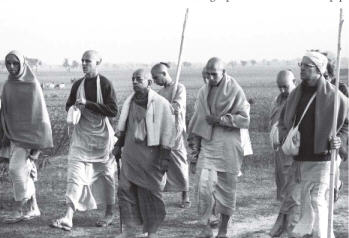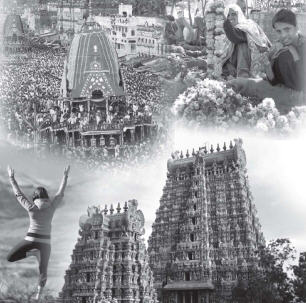Why invest in a foreign concept
that has repeatedly failed?

Wow!” The New Delhi metro bowles me over.Smooth ride, air-conditioned, clean, bright, and hi-tech metro-station it seems as if I am in a foreign country.
“This is all in preparation for the upcoming Commonwealth games,” my friend Rohit informs me. “Cool!” I whistle, jump off the escalator, and trot to the exit gate.
“Five rupees!” A seven-year-old boy blocks my path. Unkempt hair, running nose, dirt covered face, and wearing ragged clothes, he stretches his hand and then touches it to his mouth. “I am hungry; please give me five rupees to buy roti.” My stomach knots. I look around. A family of husband, wife and an infant kid, all dressed in shabby tattered clothes sit on the sidewalk, pleading the commuters for money. Construction debris and garbage litter the road.
I reach in to my bag and pull out a cookie. “Say, Hare Krsna,” I hand him the cookie. “Hare Krsna,” he smiles.
I move ahead. “Massive scam in Commonwealth Games (CWG),” the headline screams from a newspaper in a stand on my left.
“What is up with these Commonwealth Games?” I ask Rohit.
“Big mess, man.” he replies. “24,000 crore rupees. All spent on CWG. Oh, I am sorry. Maybe a few percent spent on the games; rest pocketed by the guys running the show.”
“Oops.”
“Yeah,” he continues. “Every day there is news of more scandals in the games… What games, yaar? It’s all money-making business.”
“Who decided to have these games in India?” I ask.
“Who else but our great leaders. See, yaar, these games are a Western concept. Those guys spend on sports events, but then they make money too. Infrastructure develops. Tourists pour in, businesses boom. Compare it with India. Pathetic infrastructure, the stadiums leak or are incomplete. Most top athletes have refused to participate. Tell me, which tourist will come to see a third class sporting event? ”
“I won’t,” I confess.
“Nor will I,” he says. “The only trade which seems to grow is the flesh trade. Prostitution, drugs, liquor, betting etc. are boosting up. What morals are we teaching our youngsters?
“I wonder why our country is spending so much money on of all things a sporting event. Come on, man. We are no USA or China. People here don’t have two square meals a day. Imagine how many schools and hospitals this money could have built? How many jobs it could have generated? Why can’t our leaders see the reality?”
A loud siren interrupts his speech. A convey of police jeeps escort a white luxury car having dark glasses.
“Look at that… Our great politicians on the move,” Rohit sneers. “Dark glasses filter out poverty. Hopeless. Chi !” He kicks a crushed cola tin scattered on the ground.
The tin hits a wall covered with a bright poster. “Sri Jagannatha Ratha-yatra. All are welcome.” The local ISKCON temple is advertising the Ratha-yatra celebrations. My mind fills up with images of the great Ratha-yatra parade in Puri and the ISKCON Ratha-yatras celebrated worldwide.
“Here is an option,” I chirp.
“What?”
Spiritual Shows
“Do you know,” I ask, “How many people attend the kumbh mela?”
“Lakhs…some times crores.”
“How many come for the Pandharpur Ashaòhi celebrations, and the annual Jagannatha Ratha-yatra in Puri?”
“Tens of lakhs.”
“I am happy with your general knowledge. Thousands of foreign tourists many celebrities even visit India for spiritual pursuits. Check them out at Rishikesh, Haridwar, Vrndavana, Varanasi and other holy places. Don’t you think India is a happening spiritual tourist destination?”
“Yeah, no doubt about it. East or west, India is the best.” Rohit raises his thumb.
“But what do we do to promote spiritual tourism?”
“Hardly anything.”
“Most of our holy places,” I say, “are dirty, ill-maintained, with poor infrastructure and without a transparent management. It seems that the government deliberately wants to keep the people away from visiting them.
“But look at it this way,” I took a deep breath. “Our famous temples are managed with such a system that they support the economy in an all round way. There are priests, cooks, helpers, singers, musicians, dancers, actors, florists, and farmers. Artisans make sculptures, jewellery, püja paraphernalia, handicrafts, clothes, carts, etc., and traders support Deity worship and visiting pilgrims. Hundreds are either employed directly by temple or are indirectly dependent on it. Most great cities in whole of India developed around a temple. For example Tirupati has Balaji temple, Puri has Lord Jagannatha, Trichi has Sri Raìganatha, Ujjain has Mahakala, Varanasi has Kasi Visvanatha, Madurai has Minaksi and so on. Their artistic beauty, spiritual grandeur, traditional culture and festivals are so attractive. Not just in India but wherever Vedic culture was present this concept was seen, for example Thailand and Indonesia. Those kings made investments thousands of years ago, and even now the society is reaping benefit.
“India is full of many such holy sites set amidst charming natural settings. Why not market our colorful festivals in our great holy temples and pilgrim places? Imagine inviting tourists for Baisakhi, Holi, Jhulana, Kartika, Onam, Divali, Ratha-yatra, and different parades. What about building bona fide yoga and meditation centers? Who doesn’t want peace, satisfaction, and inner joy? This will promote moral values in our youth and also generate good revenue for the nation.
“Compare it with CWG. Can the CWG give anything else of lasting value? Games will come and go. Some stars will win medals and some will lose. Soon the entire show will be forgotten. What will remain are haunted stadiums, which even the common mass cannot routinely access because they are built so far from the main habitation. What name and fame will they bring to the nation, when the entire world is smirking at the numerous corruption scandals leaking out everyday?
“Moreover, the reason behind CWG is to glorify the British queen. Now that we are independent, why should we do so? Why continue our slavish mentality? Our freedom fighters fought in to bring Indian culture, not the Western one.
Duplicate Has no value

“India’s real attraction is spirituality. Ignoring it, why run for modern icons, which do not have values? We are just duplicating the West. Duplicate has no value. Who goes for a concert of duplicate Michael Jackson? Why should we neglect a system working for thousands of year and import a foreign system that which repeatedly fails here? Our spiritual festivals beat any Western carnival, which anyway hardly click in India. Moreover, CWG proves that we cannot handle such shows. We lack the vitality and transparency to do so. In Kumbh-mela without any advertisement crores of people come. Even commercially analyzing the event we have to judge according to the output and input. For spiritual events, the input is less and output is high. For the games, the input is so high and output is zero. A huge amount of taxpayers’ money is gone, but how will India benefit? Asiad Games ended and all the money went in drain. What was the output? Without spending much money on spiritual tourism if we are getting such a wide response, imagine the result if all the money spent on CWG was used to beautify, publicize, and build infrastructure, so that even the international tourists feel comfortable in our holy towns.
“Where the Indian leaders are ignorant or callous about the vast potential of spirituality as a national resource, ISKCON’s founder Srila Prabhupada saw its global application. He writes, “…many Europeans and Americans have been visiting Vrndavana, but they have not been properly received… It is the purpose of ISKCON to give them shelter and train them in devotional service. There are also many tourists eager to come to India to understand India’s spiritual life, and the devotees in our temples …should make arrangements to accommodate them as far as possible.” (Cc. Madhya 25.183, purport)
“I agree, dear,” Rohit smiles.
Suddenly, the familiar melody of Hare Krsna kirtana flows from somewhere near. I turn back. The ISKCON Food for Life team arrives with their truck at the station we just left and begin serving Krsna-prasada. That little boy stands in the queue along with his family, holding a pot. Soon it fills with piping hot khicari. The boy goes back to his corner to enjoy the feast, joined by his family.
“See,” I smile to Rohit, “A flourishing temple can easily take care of the local society. Spirituality brings morality, social integration, and promotes economy with a vision of ultimate social welfare.” Better to invest in promoting the spiritual culture of India than blowing money on futile sporting events.
(With inputs from Pranav D. Thakker)

